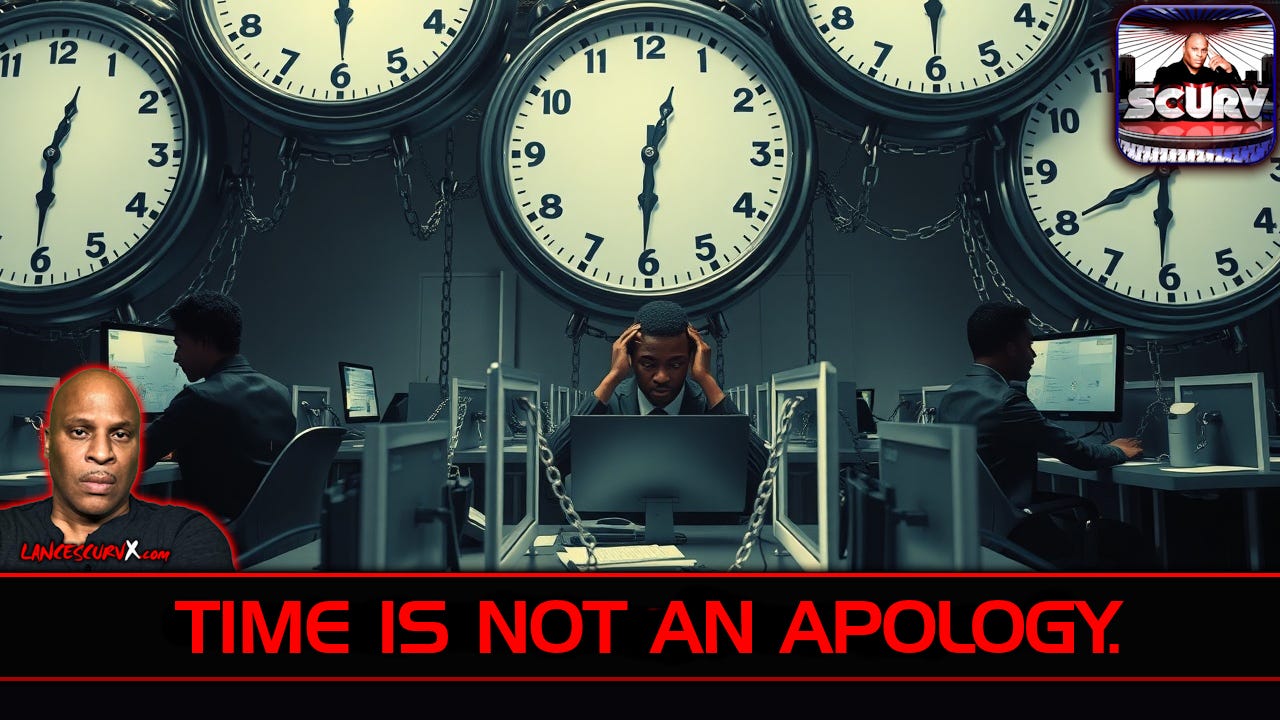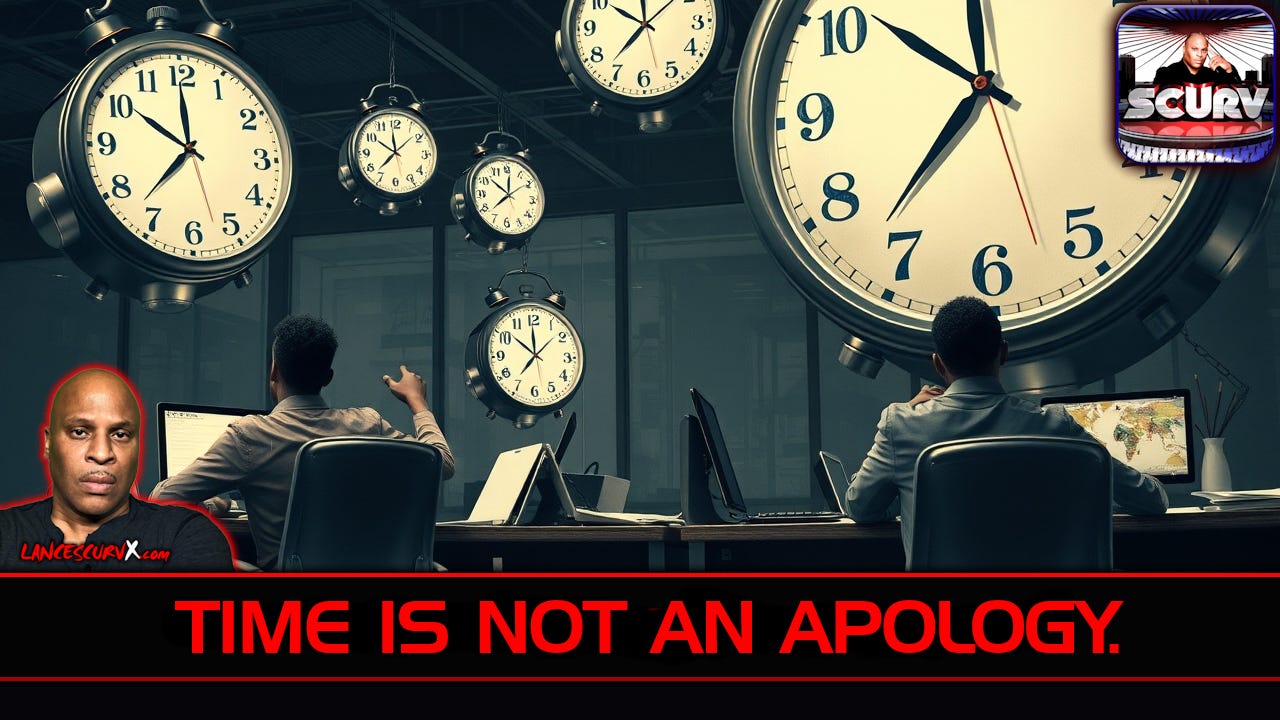TIME IS NOT AN APOLOGY...
YOU DON'T GET TO VANISH AND RETURN WITHOUT ACCOUNTABILITY
The Illusion of Time as a Cure
Some people believe that time, by itself, can undo damage. That the ticking of the clock holds a magic power to erase harm, heal wounds, and wipe slates clean. But this is a dangerous lie—especially when it comes from those who inflicted the pain to begin with. It’s convenient, really. Leave, disappear, cause harm, then re-emerge years later expecting smiles, open arms, and silence. But life doesn’t work that way, and neither do relationships.
There are people walking around today who vanished during your darkest moments. They went silent when their words could’ve brought healing. They turned their backs when their presence could’ve meant something. Then, after five or ten years of absence, they show up again as if the pain they caused has expired, as if your memory has faded, or your heart has healed itself. It hasn’t.
What they fail to understand is this: time is not an apology. Silence is not redemption. And avoidance is not an act of repair. The person who walked away doesn’t get to measure your healing by the date on the calendar. They don’t get to decide when the damage is forgotten. That choice does not belong to them.
In this world of performative healing and shallow reconnections, people need to learn that distance does not erase damage. Just because you circled back does not mean I’m obligated to meet you halfway. Just because you’ve had time to feel better doesn’t mean I have. Just because you’ve chosen to move on doesn’t mean I owe you the same privilege.
This expression is not a message of bitterness. It is a message of boundaries. It is a message of clarity, ownership, and truth. It is a reminder to every soul who has ever been wronged, left behind, or overlooked that healing is not passive—and neither is forgiveness. Let’s go deeper.
Time Is Not a Substitute for Accountability
When someone causes harm—whether through betrayal, abandonment, dishonesty, or emotional neglect—there is a cost. And that cost does not get paid through silence or the passage of time. The cost is accountability. It is the willingness to acknowledge the pain, to name the harm, and to accept responsibility without excuses.
Too often, people take the easy way out. They think that if they vanish long enough, the person they hurt will be too exhausted to care anymore. They assume time has erased the offense. But they’re wrong. The pain didn’t vanish; it just changed shape. It went from anger to silence. From confusion to understanding. From heartbreak to wisdom. And now, that person they hurt is no longer confused. They’re clear. And in that clarity, they’ve made a decision—to protect themselves.
Time doesn't heal wounds that have never been addressed. It doesn’t correct wrongs that have never been owned. Accountability requires presence, words, and actions. It requires looking the person you hurt in the eye—not sending a casual message, not leaving a vague comment, not sliding back into their life through a side door. Real accountability stands tall, speaks truth, and asks for forgiveness the hard way: with humility.
Silence Is Not Healing—It’s a Statement
Some believe silence is neutral, that saying nothing is better than saying something wrong. But silence, when you’ve caused harm, speaks volumes. It says, "I’m not ready to deal with this." It says, "Your pain isn’t my concern." It says, "I’d rather forget than fix."
For the one left behind, silence is a second wound. It leaves them to carry the burden alone, to create their own closure, to sit with questions that will never be answered. And that’s not healing—it’s abandonment. And when silence is broken only because it’s convenient, it doesn’t feel like a reunion. It feels like a violation.
People must understand this: disappearing without accountability is a choice. And returning without explanation is a form of disrespect. If your silence was loud enough to echo for years, don’t expect your reappearance to be met with applause. If your absence spoke clearly, don’t be shocked when the welcome mat is gone.
Distance Does Not Erase Damage
Distance is not redemption. Moving away, cutting off contact, or going silent for years doesn't undo what was done. It just pauses the pain. The wound may not bleed every day, but it still exists. And the moment that person returns, the wound remembers. That’s not bitterness—that’s memory.
People often assume that their own peace, their own time away, gave both sides a clean start. But the truth is, not everyone heals the same. Some people need answers. Some need apologies. Some need deep conversations that never happened. Without those things, healing doesn’t happen—it just hibernates.
Distance, when used to avoid responsibility, is not spiritual. It’s selfish. It's not maturity. It's cowardice. And when someone tries to erase the damage simply by staying away, they insult the depth of the harm they caused. Real healing requires return, repair, and real words—not just time zones and silence.
Reappearing Is Not the Same as Reconnecting
When someone who hurt you returns, they often come back with a friendly tone, casual words, and no mention of the past. As if the offense is no longer relevant. As if a simple “Hey, how are you?” can dissolve years of absence and pain. But showing up isn’t the same as making things right. Reconnecting requires work.
You don’t get to break something and then act surprised when it’s not the same. You don’t get to cause distance and then complain about the emotional walls. And you definitely don’t get to expect closeness just because you came back. Presence is not reconciliation. Proximity is not peace. The fact that you’re in the same room doesn’t mean the damage is undone.
Relationships aren’t built on location. They’re built on honesty, respect, and trust. And if you shattered those things, you don’t get to rebuild them just because you returned. You have to earn your place again—with effort, with truth, and with real change.
Private Offense, Public Apology
When someone disrespects you in public, the apology doesn’t belong in private. If the damage was loud, the repair must be louder. Too many people want to make amends quietly because it protects their image. But it’s not about image—it’s about integrity.
If you hurt someone in a room full of people, apologize in a room full of people. If you disrespected them on a public platform, don’t sneak into their inbox with a whisper. Come to the same stage where you failed and make it right. Let the apology match the impact.
The truth is, many people only apologize when they fear losing access. Not because they understand the harm, but because they miss the benefits of being close to you. But if your apology is not driven by awareness, it’s manipulation. And no, we’re not falling for it.
Here's the Closure
Let me make this clear one more time: I don’t owe you softness because you circled back. I don’t owe you access because you miss me. And I don’t owe you silence just because you’re pretending to be healed. Time does not earn you the right to avoid the consequences of your choices. Absence does not repair harm. And reappearance does not guarantee welcome.
If you want reconciliation, it starts with responsibility. If you want peace, it starts with truth. And if you want access, it starts with apology. But not a whispered apology. Not a convenient apology. A real one. One that owns everything—loudly.
Don’t come back expecting the version of me you left behind. That version no longer exists. The person you hurt evolved. The person you abandoned built boundaries. And the door you walked out of? That door is locked, because clarity closed it.
So don’t mistake time for progress. Don’t confuse distance for peace. Don’t think that silence means forgiveness. And don’t assume a second chance is automatic.
If you really want to make things right, it takes more than just showing up. It takes honesty. It takes courage. It takes humility. And until you come with those things, don’t expect anything from me.
Not warmth. Not welcome. And certainly not forgetfulness.
Time is not an apology. It’s a test. And I’ve passed mine.
Sincerely,
LanceScurv





Fantastic article 👏🏽